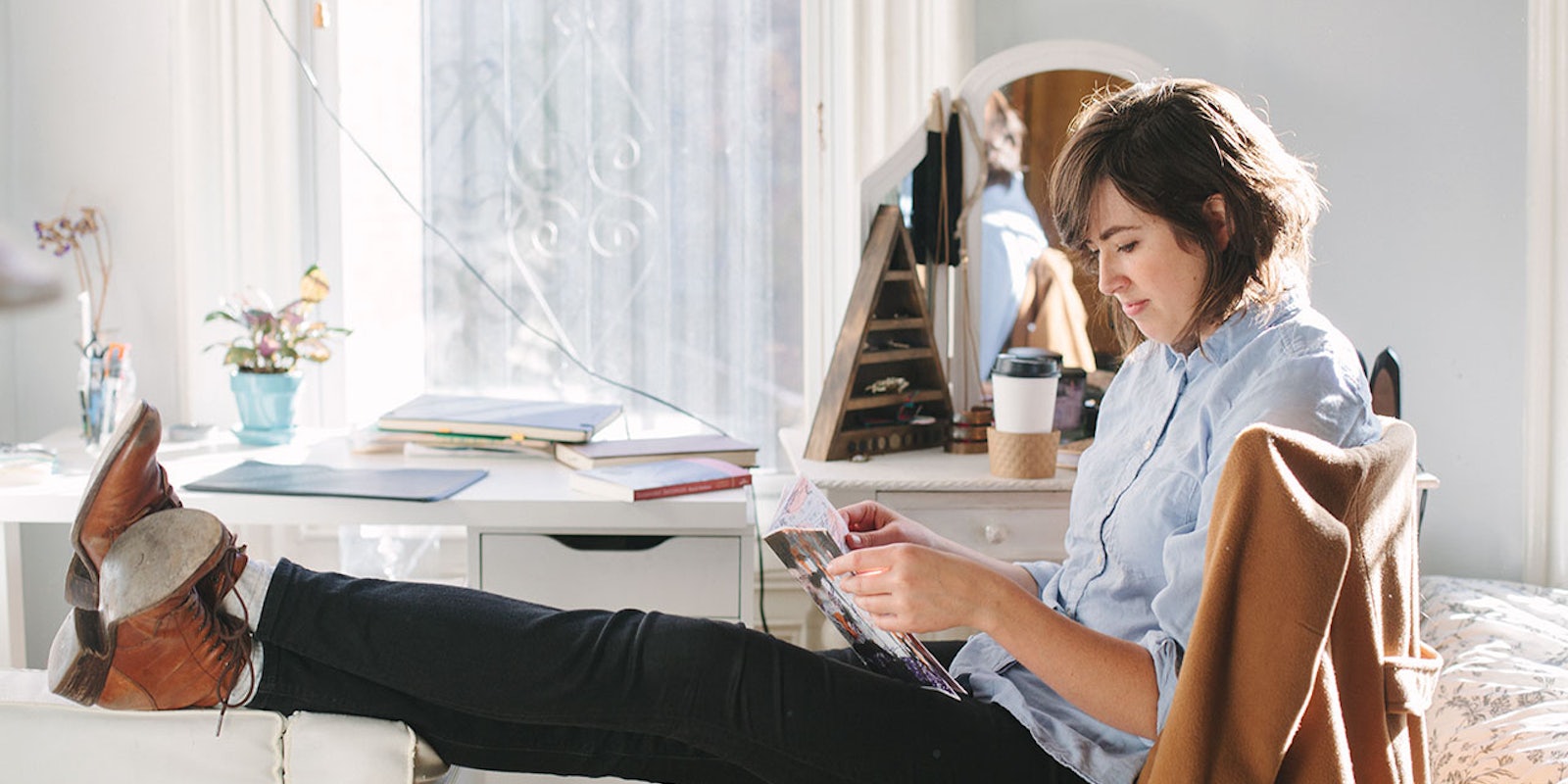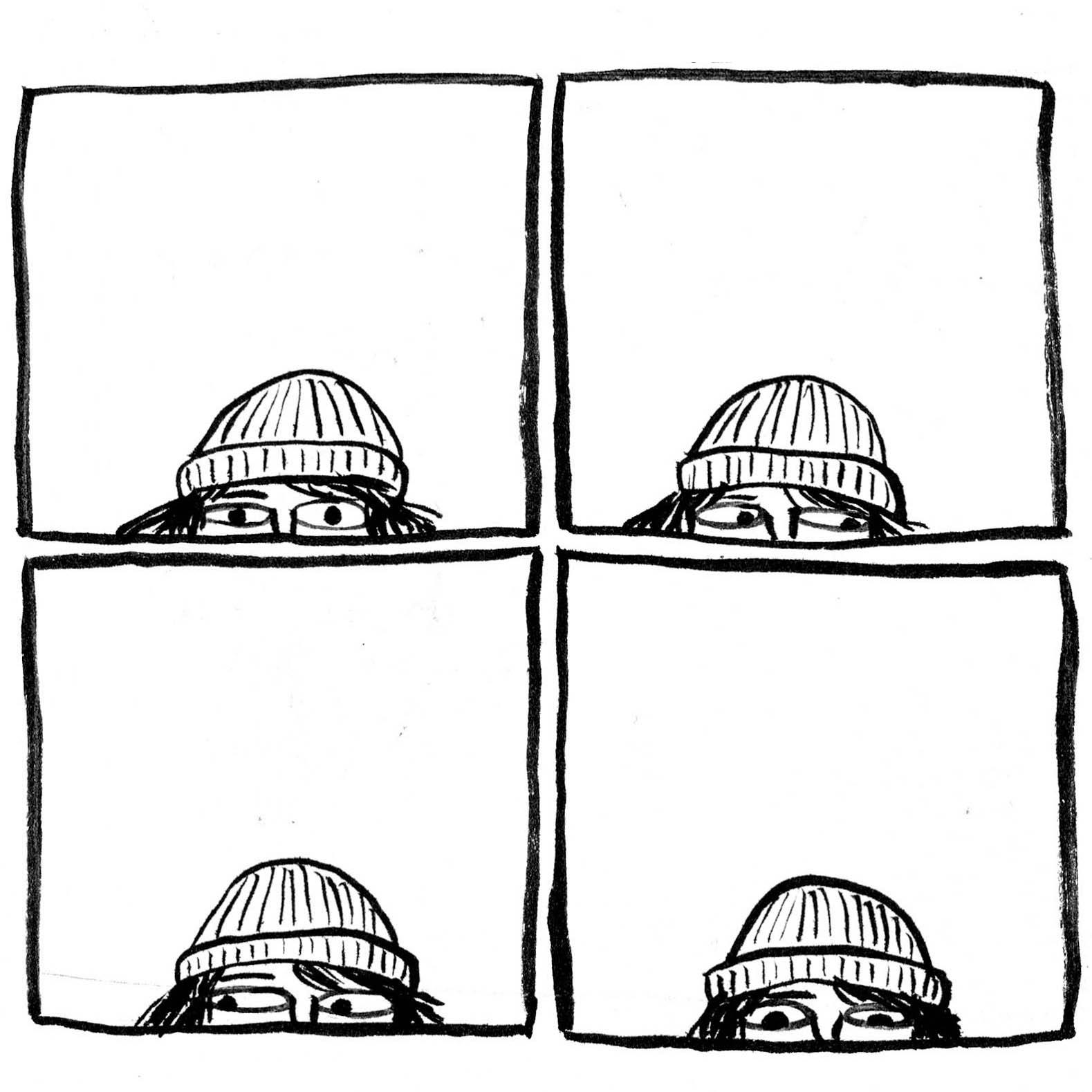The second thing you should know about Hallie Bateman is that she is very tall—taller than you think, unless you think she’s 5’11”. The first thing is that she is incredibly talented: Bateman is a visual columnist at the Awl and the Oyster Review, has the best TinyLetter in town (see the entry “A Carrot Dipped in Ink”), and was named to the L magazine’s 30 Under 30 in 2014. Her work is vivid, poignant, and devastatingly clever, but what’s even more impressive is its sheer existence. How many 25-year-old freelance illustrators do you know? How many 25-year-old freelance illustrators do you know who are actually getting paid?
Full disclosure: Hallie Bateman is my best friend. Well, that’s not quite true—I want her to be. She’s strong, polite, talented, witty, and vegetarian. If I’m going to disclose anything, it’ll be that Hallie has done work for the website that I edit, the Hairpin, and designed beautiful business cards for me that I paid her money for. She has my phone number in case of emergencies.
I met Hallie at Speedy Romeo’s, a Brooklyn pizzeria, so I could ask her about her background, her art, and how she takes care of her greatest asset: her hands. And then she turned the tables, interviewing me. It was straight out of Exit Through the Gift Shop, and she was Banksy.
Be as detailed as you want, but I literally want to know everything that’s ever happened to you. Where did you go to school?
The University of Puget Sound. It’s not an arts school; well, it’s a liberal arts school, in Tacoma. It was sort of my dream school.
Why?
For some reason I just got a really good feeling from it. I actually transferred there from UC Santa Cruz, because I couldn’t pay for [Puget Sound]. It’s an expensive private school. I was at Santa Cruz, it was huge, a bunch of kids from my high school were there—I just felt like exactly the same person. So I decided to transfer and go where I wanted to go. I got the money that time, so it worked out.
What did you major in?
Creative writing! English.
That makes a lot of sense. Even though your medium is primarily illustrative, there are still a lot of words. So I see it! What sort of creative writing did you do, and where did you think you’d end up when you graduated?
I actually started with film, but the film majors were terrible, so then I did English. English was sort of my default: I was always good at writing, and my parents are both journalists for the local paper in my hometown. I think that’s why writing was always not easy for me, but easier than, say, math. So I declared it, just because it was it felt like what I could do. I vaguely thought I could still end up doing journalism, but then by the end of school, I had become obsessed with illustration.
“A few weeks ago I got a $300 check after four months of emailing. At that point, when you get the check, it feels like a slap in the face.”
Have you always drawn, or did you start in college?
I’d always drawn, just forever. When I was kid, I made comics, and, actually, I illustrated a story my dad wrote for the paper when I was 11. And my mom used to write for kids’ magazines; she used to write short stories and sometimes get published in magazines like Cricket. I used to always ask, “Mom, can I illustrate?” She’d always let me illustrate it and say that we could send it in, [even though] I knew there were illustrators who worked for the magazine.
And now that you’re freelancing, how do you make money?
In the last month or so I’ve made money from:
- my comics
- my mugs
- small illustration gigs
- Society 6
- working at a kids’ craft table at a holiday fair (that was a nightmare but paid really well actually)
- tutoring a 14-year-old genius
- found $5 on the ground
I also just got a part-time, office-type job. It’s important for me to be working part-time both for the steady paychecks and to get me out of the house. I hate working from home full-time. But that’s just for now. Comics are totally gonna make me filthy rich someday.
“Comics are totally gonna make me filthy rich someday.”
Is freelancing scary?
I’m finding a lot more opportunities than I have time for. I’m also trying to have a life outside of work, and not say no to those opportunities, so the result has been melding my work more and more with my life in a good way. Like, at coffee with a friend, I’ll just be sure to talk about whatever I’m working on, and ask them about it. Part of it is being able to justify having a social life, and part of it is just making the work more interesting.
But there seems to always be one delayed check you’re chasing. A few weeks ago I got a $300 check after four months of emailing. At that point, when you get the check, it feels kind of like a slap in the face. But I try not to get too fired-up or angry about it. I just move on, learn from my experiences, and choose my clients carefully. And, again, this is the whole reason why I wanted a part-time job. To save me from getting worked up about a $300 check.
How do you take care of yourself, as a creative? Specifically, how do you take care of your hands? Do you have insurance on them? Can you suggest lotions?
I recently was hired for a part-time job at as a barista at a cafe. As I was training, they asked me if I would mind filling in as the dishwasher until they hired someone officially. I awkwardly refused, saying my hands are my livelihood and I didn’t want to expose them to chemicals and hot water all the time and get those weird illnesses dishwashers get. Which was mostly an excuse because I really, really don’t like washing dishes.
“When I present it to the public, I see an ugly side of myself: I am very insecure, beholden to the opinions of others, and I LOVE attention.”
They fired me that same day, I think because I said that. It’s fine. I have a better part-time job now.
How do you make it big as a illustrator?
This is a stolen definition from my friend Bob Shea, who’s a children’s book author and who I really look up to: Success is just being able to keep doing what you want to do.
It’s not that I want to be super-rich or super-well-known. I just want to be comfortable and have venues. I think that having a venue for your work that feels legit.
How have you been able to use the Internet—Twitter, Instagram—to get your work out there? How has it helped or hurt your career?
I wouldn’t have a career if it weren’t for Twitter. And it has hurt in the sense that if I hadn’t found success on the Internet, maybe I’d be studying nocturnal birds and looking up at the night sky, knowingly, instead of updating my Instagram to see if I got any likes.
I’m mostly joking. I can’t stay away from art. The Internet allows me do it for a living. My audience is basically my Twitter friends and my parents. Sometimes I email my pieces to my dad. He doesn’t really know how to use the Internet, but his New Year’s resolution is to get better at it. Dad, if you’re reading this, I’m proud of you!
Is it scary giving your work to the entire Internet?
It is scary, but the scariness is all on my side of the screen. When I publish something, I’m frightened by my own desperation for approval, [and I get this] strange, downcast feeling. When something is published, received, and then it’s gone … I am still the same person, sitting in my room, alone, exhausted and surrounded by scraps of paper. Success, or “success,” does not transform you. Why do I keep believing it will?
https://twitter.com/hallithbates/status/552496125413191680
I think I make art to amuse myself, to process my thoughts and feelings, to ask questions. But when I present it to the public, I see an ugly side of myself: I am very insecure, beholden to the opinions of others, and I LOVE attention.
Have people reached out because they loved your Instagram page or your Twitter presence, or have most opportunities popped up via professional references?
I guess most of my opportunities have come about through friends on social media, and my own impulse to be like, “HI, LET ME DRAW SOMETHING FOR YOU!” I’ve actually been trying to stop myself from doing that. Sometimes I look up and I’m just writing an email to someone proposing some project, or saying yes to something when I’m already grossly overcommitted. It’s ambition until you start to miss deadlines, and your work suffers and your body suffers. Then it’s compulsion.
Read part 2 of this interview series: “How to make it as a freelance writer on the Internet,” featuring the author of this story, Jazmine Hughes.
Illustrations by Hallie Bateman | Photo by Darcy Rogers



